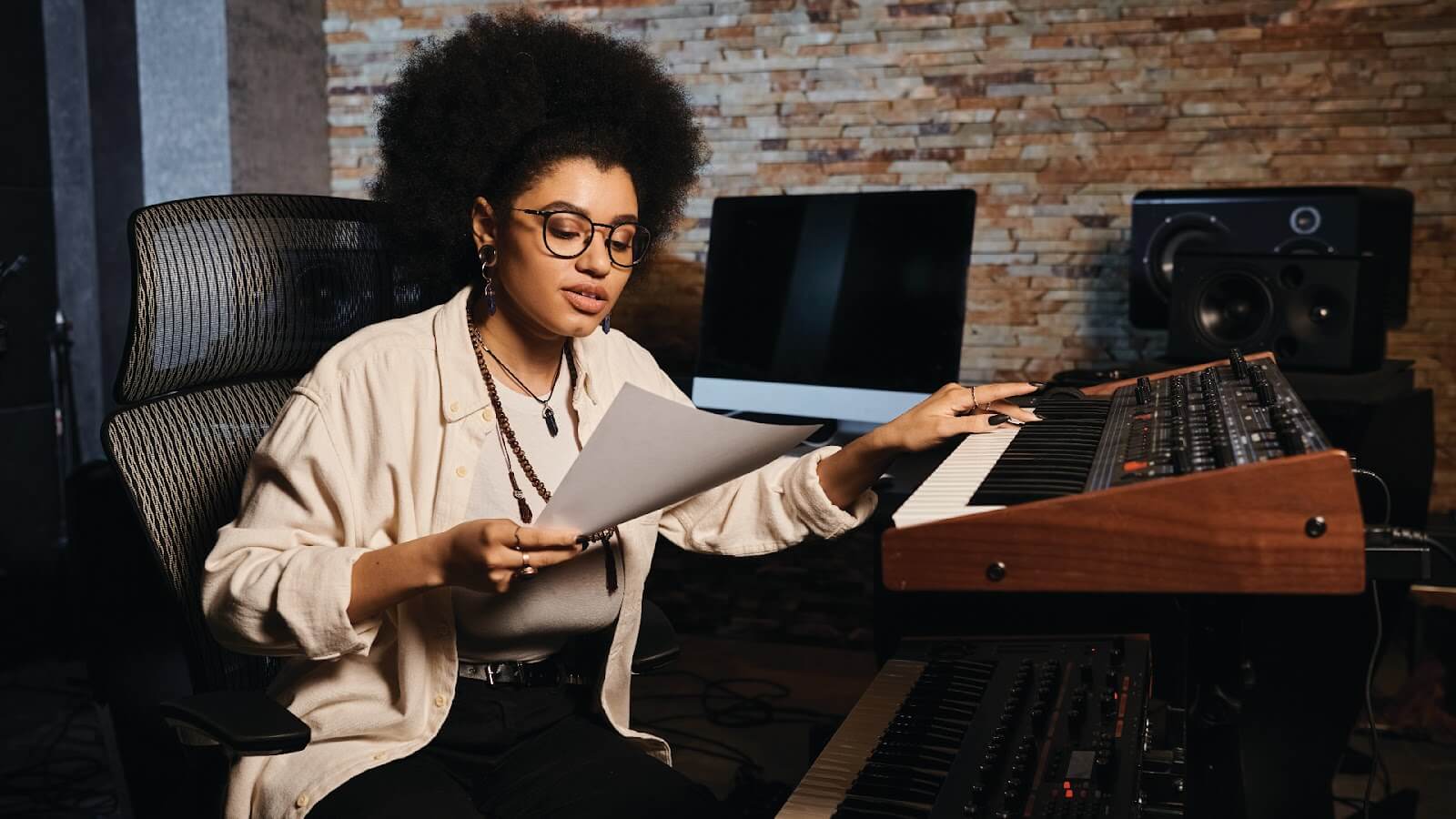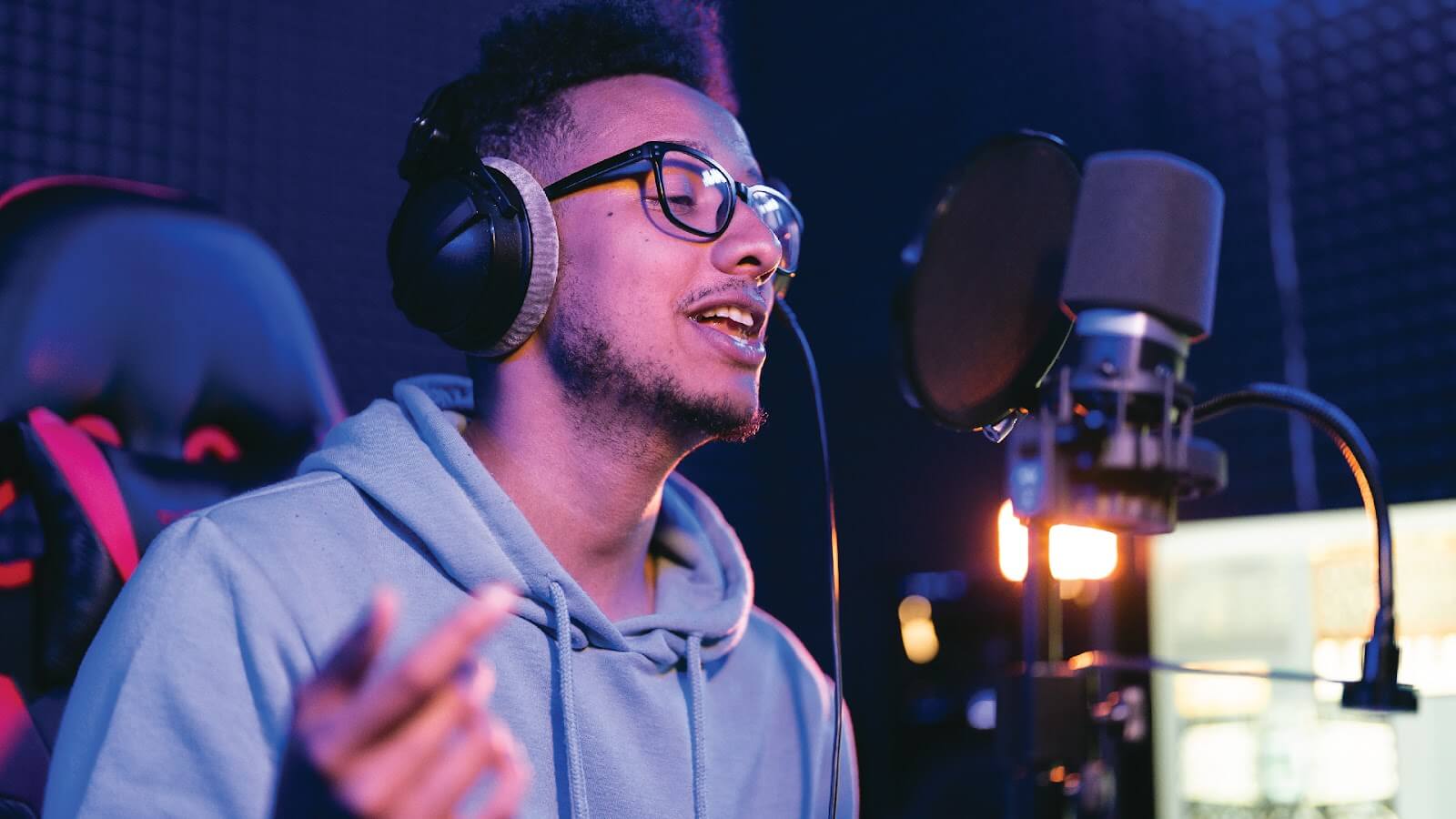Table of Contents
Have you ever wondered what it means to be a songwriter? Many people might think that a songwriter’s job is to put together catchy lyrics, either for themselves or for someone else. But real songwriters know it’s so much more than that — it’s about capturing a feeling, telling a story, and turning even the smallest moments into something unforgettable. To us, true songwriters are students of life, people who find meaning in the moments most people overlook, and give them rhythm, a voice, and a pulse.
So, how do you become a songwriter? We believe it comes down to a few key moments: learn to see what others miss, listen closely, and turn those raw moments into music.
In this guide, you’ll find the tools you need to start (or sharpen) your craft as a songwriter. We’ll cover everything from carving out a career in songwriting to tips on creating lyrics and melodies that hit home. Whether you’re looking for tips on how to become a songwriter for beginners or you’re a pro ready to take your skills further, you’ll find the tools you need to help bring your songs to life.
How Do Songwriters Make Money?
Songwriting can be a promising career with multiple paths for making an income. While writing songs that resonate is the most important part of it all, getting paid for your work involves exploring different avenues and understanding how the music industry values songs.
Here are some of the main ways songwriters turn their craft into revenue:
Royalties from Publishing
If you’re wondering how to become a songwriter for a record label, you may have heard about royalties before. As a professional songwriter who sells their songs for a living, every time a song you’ve written is streamed, downloaded, or played on the radio, you earn royalties. Publishing royalties come from multiple sources — performance, mechanical, and sync royalties — and are often split with the publishing company that helps license and promote your music.
Sync Licensing
Sync licensing lets songwriters earn money by allowing their songs to be used in films, TV shows, commercials, video games, and online content. When a producer or director chooses your song for a project, you get paid a licensing fee upfront, and you earn performance royalties each time it airs.
Songwriting for Other Artists
This is perhaps the most popular form of income when people think about becoming a songwriter. In this model, if you write a song for another artist and it becomes a hit, you earn a portion of the royalties and often a flat fee upfront. This route can be incredibly lucrative if you’re able to write music that appeals to established artists and fits their style.
Self-Releasing and Performing Your Own Songs
Some songwriters release and perform their own music, either independently or by partnering with a record label. When you’re both the songwriter and the performer, you can earn income through streaming, downloads, live performances, merch sales, and even fan support platforms.
Commissions and Custom Songs
Songwriters can also earn money by creating custom songs for special projects, like wedding songs, commercial jingles, corporate events, or even private clients. There are even apps and websites to hire a songwriter and commission a custom song for a special occasion. These pieces typically come with a one-time fee and allow you to create tailored work that still showcases your writing skills.
Teaching and Workshops
If you’re a skilled songwriter, sharing your expertise with aspiring songwriters through teaching, workshops, or online courses can also be a solid income stream. Songwriters with industry experience and knowledge often have an edge in this area and can build a following among those looking to learn the craft.
Crowdfunding and Fan Support Platforms
Similarly, songwriters who have built a following can use platforms like Patreon, Instagram, or Kickstarter to connect directly with their fans, who contribute financially to support their creative work. Crowdfunding can provide stable monthly income and allow you to engage closely with your audience while focusing on your music.
How to Become a Professional Songwriter
Learning how to be a songwriter requires more than just a deep passion for music. A career in professional songwriting requires the right mix of creativity, skills, and insights to help you navigate the music industry.
Here are some steps that can take you from writing songs for fun to making a living from them.
Build Foundational Skills
Becoming a professional songwriter means developing both technical skills and the personal qualities that support your work, including:
Hard Skills:
- Lyric & music writing: To cultivate this skill, focus on creating lyrics and melodies that aren’t just catchy but carry meaning, tell stories, and resonate with people. Check out our blogs, How to Write Lyrics Like a Pro and How to Write a Song for Beginners, to learn more about writing music and lyrics.
- Instrument proficiency: Knowing one or more instruments isn’t required, but it can help you better compose and experiment with your music.
- Recording and production: Familiarize yourself with basic recording and production software to create demos that sound professional.
Soft Skills:
- Communication and collaboration: Songwriting often involves working with other artists or industry professionals, so being able to share and listen to ideas is key.
- Persistence: The music world can be competitive; resilience and patience will help you push through challenges and stay committed.
- Networking: Building relationships is almost as important as the music itself — strong connections can lead to more opportunities to get your work out there.
Find Your Niche and Style
Your unique style and voice are what will set you apart. So, take time to explore different genres, listen to the artists who inspire you, and identify the elements that resonate with you most. Do you love writing soulful ballads, catchy pop bridges, or clever rap lyrics? Experiment with blending influences to create something that feels new and original. Having a distinctive sound will make your songs memorable and help them stand out from the rest.
Networking in the Music Industry
Songwriting doesn’t happen in a vacuum, and the connections you make can open doors you wouldn’t reach on your own. Even if you don’t know anyone in the music industry yet, get your foot out the door by going open mics, joining online songwriting forums, or attending music workshops where you can meet like-minded people. Start building relationships with producers, other songwriters, and artists who share your passion. Reach out on social media, collaborate on projects, or simply ask for advice. Having a solid network gives you more opportunities and support as you build your career.
Create Your Portfolio
Think of your portfolio as your “greatest hits” collection that shows what you can do. Include recordings of your best songs, and make sure the recordings are high quality so they represent you well. You’ll want a range of songs that showcase your style and versatility but keep it cohesive so people can get a sense of your sound. If possible, add visuals that fit your vibe, like a website, a YouTube channel, or your professional SoundCloud page.
Get to Know Music Rights and Copyright Laws
If you’re dying to learn how to become a songwriter for a label, it’s important to understand the basics of music rights before licensing your music. There are many resources, including the U.S. Copyright Office where you can learn how to copyright your songs and understand your options. Organizations like ASCAP and BMI can also help you get started with registering your songs.
Pitch Your Songs
There are many ways to pitch your songs to reach a wider audience and get your songs noticed by the right people. Start by researching artists, producers, music supervisors, and companies that are looking for new songs in your style. When reaching out, keep your pitch concise but engaging, and always attach a professional recording and, if possible, your resume. Online platforms like music libraries or pitching sites can also connect you with the right people.
Jump on Professional Opportunities
Whenever a chance to work professionally comes along — like a songwriting competition, writing for a local project, or collaborating with other artists — take it. Keep an eye out for internship programs, open calls for music submissions, or local events in your area. Every project you take on builds your experience and expands your network, giving you more to show for your work.
Promote Your Work
Don’t be shy about putting yourself out there, especially on social media platforms like YouTube, TikTok, SoundCloud and Instagram. Use these platforms to share clips of your music, behind-the-scenes looks at your writing process, and any finished projects you’re proud of. These are also great places to engage with other artists, interact with listeners, and keep your content consistent with your style.
Keep Improving Your Craft
Becoming a professional songwriter is an ongoing journey, so never stop honing your skills. The best way to keep improving is by reaching out and asking feedback from trusted sources, staying open to suggestions, and keep experimenting with your sound. Attend songwriting workshops, watch tutorials, or take courses to sharpen your techniques. Stay curious and maintain a learner’s mindset — the more you invest in your craft, the better your music will connect with others.
Tips for Making It as a Songwriter
Embarking on a songwriting career requires dedication, continuous learning, and, above all, never giving up. Here are some tips to help you stick with it:
- Write regularly: Commit to writing daily or weekly to refine your skills and develop your style and voice.
- Study successful songs: Analyze songs you admire to understand their structure, lyrics, and melodies.
- Embrace feedback: Seek constructive criticism from peers, mentors, or songwriting groups.
- Collaborate with others: Co-writing can introduce new perspectives and ideas, enhance your creativity, and expand your network.
- Record your work: Create quality demos of your songs to showcase your talent to potential collaborators or industry professionals.
- Stay informed about the industry: Keep up with music trends, industry news, and changes in music rights and copyright laws to navigate your career more effectively.
- Build your resilience: Learn to handle rejection and use it as motivation to improve and persevere in your songwriting journey.
- Promote your work: The music industry is not the place for being overly humble. Use social media and other platforms to share your music, engage with audiences, and build a following.
Learn from the Experts at Cadomu Music Academy
At Cadomu Music Academy, we’re on a mission to help songwriters find their voice and carve out a path in the music world. We believe music is more than a craft — it’s how we connect, tell stories, and express what words alone can’t. Our goal is to give aspiring songwriters the skills they need to succeed, while staying true to the heart and soul of their music.
With courses led by experienced educators, we bring together timeless music traditions and the latest technology to help you create without compromising your unique sound. Join a community of like-minded musicians and take your songs to the next level. Explore our songwriting classes today!
FAQs
How do you become a songwriter for a record company?
There are many ways to become a songwriter for a record company, and everyone’s journey will look different. We recommend starting by building a strong portfolio, networking in the music industry, and pitching your songs to artists, managers, and producers who work with record labels.
Do I need a record label to become a songwriter?
Not necessarily, many successful songwriters work independently. If working for a record label doesn’t interest you, you can always write for artists directly, pitch songs, or self-release your music.
How long does it take to become a songwriter?
There’s really no one-size-fits-all answer for this one. Ultimately, it varies and typically depends on a variety of factors. Some see results within a short amount of time, while others take longer to establish themselves. Just keep one thing in mind: no matter how long it takes, don’t give up!
What is co-writing?
Co-writing is collaborating with other songwriters to create a song together, blending ideas, lyrics, and melodies for a unique final product.
How do beginners start songwriting?
Start by learning how to write songs, experimenting with melodies, and practicing basic music theory. Listen to songs you love and analyze what makes them work.
How do I sell a song I wrote?
You can sell songs by pitching them to artists, music publishers, or through online platforms that connect songwriters with buyers.
Do I need a professional recording studio?
No, you don’t need a professional studio to become a songwriter. With quality home equipment like a USB microphone, an audio interface, and basic recording software, you can produce solid demos from home — without breaking the bank.




